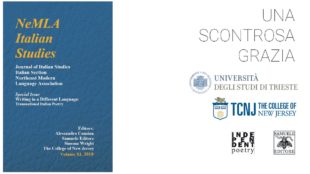
da MonicaG | Mag 20, 2019 | notizie
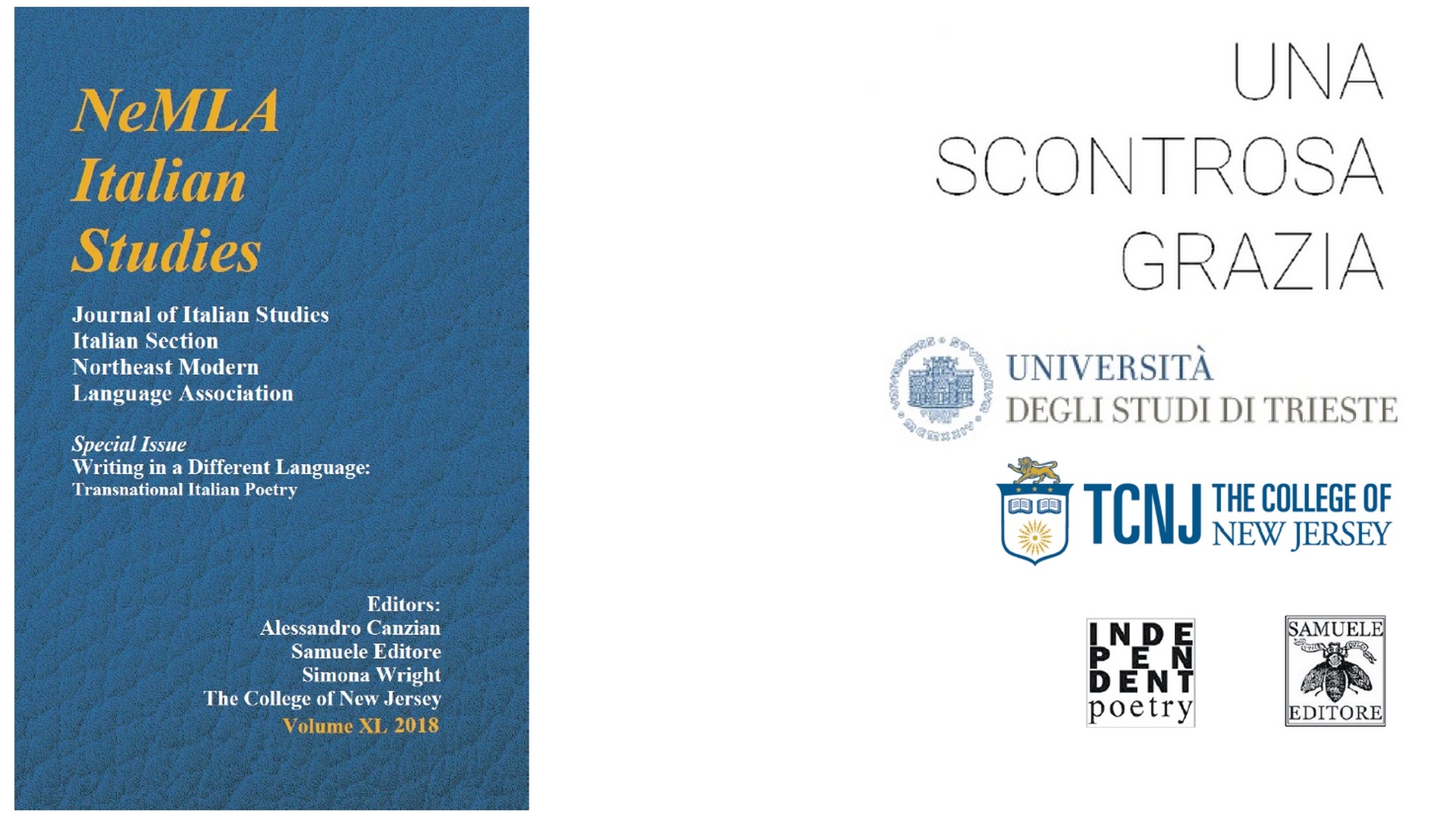
WRITING IN A DIFFERENT LANGUAGE
POESIA CONTEMPORANEA E ALTERITA’ LINGUISTICA
mercoledì 22 maggio 2019 – ore 17:00
Università di Trieste
Sala Atti, Dipartimento di Studi umanistici
Androna Campo Marzio, 10
Mercoledì 22 maggio, alle ore 17:00, 60esimo incontro del ciclo Una Scontrosa Grazia eccezionalmente ospitata dal Dipartimento di Studi Umanistici dell’Università di Trieste. Verrà infatti proposto un seminario a partire dall’ultimo numero della rivista NeMLA, “Writing in a Different Language”, curato da Simona Wright e Alessandro Canzian, con una riflessione sulla poesia contemporanea che sceglie di usare una lingua “diversa” e si confronta con l’alterità linguistica. Il seminario, che avrà relazioni di Simona Wright, Sergia Adamo, Rodolfo Zucco e interventi di Sandro Pecchiari, Ilaria Boffa, Monica Guerra, Anna Tauzzi, verterà sul contesto contemporaneo ma anche sul bisogno costitutivo della scrittura letteraria di mettere in gioco l’alterità.
“Writing in a Different Language: Transnational Italian Poetry” è un progetto di Simona Wright (College of New Jersey) e Alessandro Canzian (Samuele Editore) che ha come obiettivo fondamentale la domanda: cosa significa scrivere poesie, oggi, in una realtà che predilige in maniera importante il rapporto con il pubblico attraverso la partecipazione a eventi, letture, festival? Per tentare di rispondere a questo quesito sono stati selezionati otto poeti residenti in Italia che scrivono saltuariamente o costantemente in inglese. Che scrivono testi che non hanno cioè un’immediata fruibilità in occasioni pubbliche. Ne è emerso un laboratorio in cui la lingua viene esaminata, disfatta e sfidata. L’inglese diventa uno spazio creativo in cui l’attraversamento dei confini può produrre originali impollinazioni incrociate e, auspicabilmente, nuove forme di poesia.
Il Northeast Modern Language Association – NeMLA con sede presso l’Università del Buffalo nello stato di New York, è un’organizzazione no-profit di insegnanti e studiosi di letteratura, lingua e cultura. Affiliata alla Modern Language Association (MLA), NeMLA organizza un forum per la diffusione e l’avanzamento dell’insegnamento nelle lingue e letterature moderne. Ogni anno, la convention del NeMLA offre l’opportunità di portare avanti una tradizione di ricerca vivace e scambio pedagogico in un evento di quattro giorni, nel quale vengono affrontate diverse tematiche attraverso tavole rotonde, seminari, workshop interattivi, eventi speciali, letture, proiezioni di film e conferenze.
Questo appuntamento di Una Scontrosa Grazia è in collaborazione con Università degli Studi di Trieste, The College of New Jersey, Samuele Editore, Independent Poetry
clicca qui per il link alla notizia sul sito dell’Università di Trieste.
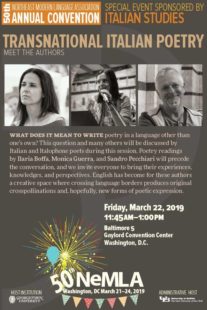
da MonicaG | Apr 15, 2019 | notizie
La Conventionn organizzata dalla NeMLA (North-east Modern Language Association), della quale si è dato conto nel n. 43 del Ponte rosso (pp. 43 e 44), si è svolta nelle giornate dal 21 al 24 marzo 2019.
Ogni giornata offriva conferenze dalle 8.30 di mattina alle 8:00 di sera, suddivise in diversi track che si svolgevano contemporaneamente, permettendo una scelta continua di oratori e di argomenti.
La cosa interessante era la totale mancanza di tempi morti, nemmeno durante le presentazioni che dovevano attenersi rigidamente al tempo concesso ad ogni singolo oratore. Per lasciare poi un tempo sufficiente per l’interazione con il pubblico intervenuto.
qui l’articolo
da MonicaG | Feb 27, 2019 | antologie
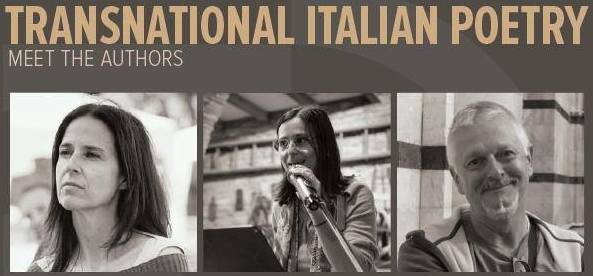 Introduction: Transnational Italian Poetry
Introduction: Transnational Italian Poetry
Alessandro Canzian, Simona Wright
Literature, and poetry in particular, has always been a tool to understand culture. Sometimes it has even gone beyond and helped cultures to expand and develop. Poets understand that language, essential to human survival, has its own limits, but they also see these limits as an incentive to produce new expressive forms, other languages that transcend the old one to understand and tell what is not yet immediately comprehensible or immediately utterable. This awareness, coupled with the desire to trespass the limits of one’s language, have produced what we today call literature.
Language, intended as an instrument that offers the word countless opportunities, requires nevertheless a corollary of skills. Using it in a poetic way requires a certain familiarity with literature, or rather with literatures, with the oral and written traditions that preceded it, formed it, and complicated it. Language is therefore bound by the vast experience of the past. Italian, a language with a time-honored literary tradition, offers an exceptionally interesting case. On the one side, it boasts the legacy of its noble past, and contemporary poets frequently return to the classics to draw inspiration and new meaning. On the other, that same legacy becomes a burden that crushes the emerging voice under the immense weight of its greatness. This contradiction has produced different reactions, driving poets to experimentations that were considered at times reactionary or decadent by later authors, but which nonetheless have impacted the literary movements of twentieth-century Italian letters.
In the second part of the twentieth century, after the tragic experiences of fascism and WWII, the economic boom, the years of terrorism, the hedonism of the eighties, and the economic and political crises Italians experienced in the new millennium have exacerbated what Pier Paolo Pasolini defined as Italy’s “anthropological mutation.” The value he found in cultural and linguistic authenticity had been rejected while consumerism had deprived the new generations of the utopian dynamism that usually characterizes them. The great dreams that animated political and social movements in the sixties and seventies was extinguished, yielding a widespread sense of disenchantment and frustration. From the nineties, the ethical drift caused the rejection of every sense of civic responsibility while politics was bent to serve exclusively individual interests and personal agendas. Italy’s cultural and social crisis was central to the poetry of the period and testified inexorable ruin often more effectively than narrative production ever could.
[…]
The editors of this volume are aware of the experimental and provisional critical approach utilized in this project, but wanted nevertheless to start a conversation on the possibilities offered by the complexities of our reality as they are witnessed, recorded, and experienced by Italian and Italophone poets today. We hope to have started a productive conversation that may help Italian and Italophone authors to develop their poetic expression further and we invite critics to articulate their own perspectives on this emerging phenomenon. Globalization informs our lives, often in a negative way. We hope that this exploratory volume inaugurates a debate on the expressive possibilities of the countless transnational encounters in which we dwell every day, at both the linguistic and the cultural level. Most of all, we hope that the rich complexity of these encounters can be translated in new and original poetic forms.
CONTENTS
Introduction: Transnational Italian Poetry
ALESSANDRO CANZIAN AND SIMONA WRIGHT
Translingual Peripheries: Ilaria Boffa’s Practice of Everyday Poetry
SIMONA WRIGHT
Selected Poetry
ILARIA BOFFA
A Strange Geometry
VICTOR XAVIER ZAROUR ZARZAR
Selected Poetry
MOIRA EGAN
The Depths of Love and Sorrow in Allison Grimaldi Donahue’s Poetry
CRISTINA PERISSINOTTO
Selected Poetry
ALLISON GRIMALDI DONAHUE
Visiting a Strangely Familiar Country: Writing in Another Language
ERNESTO LIVORNI
Selected Poetry
MONICA GUERRA
Magarian’s Poetic Beasts
ANDREA SIROTTI
Selected Poetry
BARET MAGARIAN
Innovation and Invention in “Kidhood”: When a Poet Writes in a Different Language
AL REMPEL
Selected Poetry
SANDRO PECCHIARI
Brenda Porster: The Body as Home, the Home as World
ALESSANDRO CANZIAN
Selected Poetry
BRENDA PORSTER
The Immense Structure of Happiness: Rachel Slade and the Metamorphical Poetry of Apocryphal House
LOREDANA MAGAZZENI
Selected Poetry
RACHEL SLADE
qui tutto l’estratto
qui il link alla pubblicazione completa
qui il link all’introduzione del prof. Livorni
qui il link alla raccolta expectations
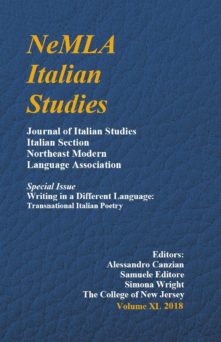
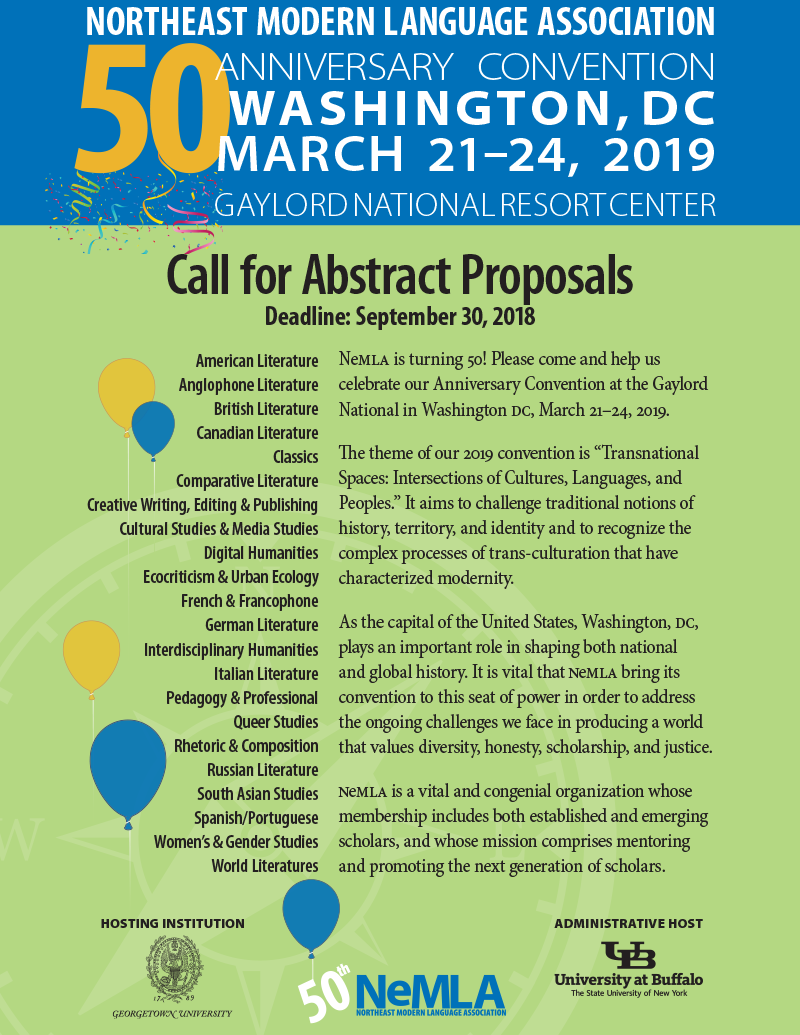
da MonicaG | Lug 29, 2018 | notizie
Un grande onore partecipare a questo progetto che porterà la poesia italiana oltre oceano. La pubblicazione uscirà a dicembre e a marzo sarà presentata alla 50esima Convention del Northeast Modern Language Association.
qui l’articolo

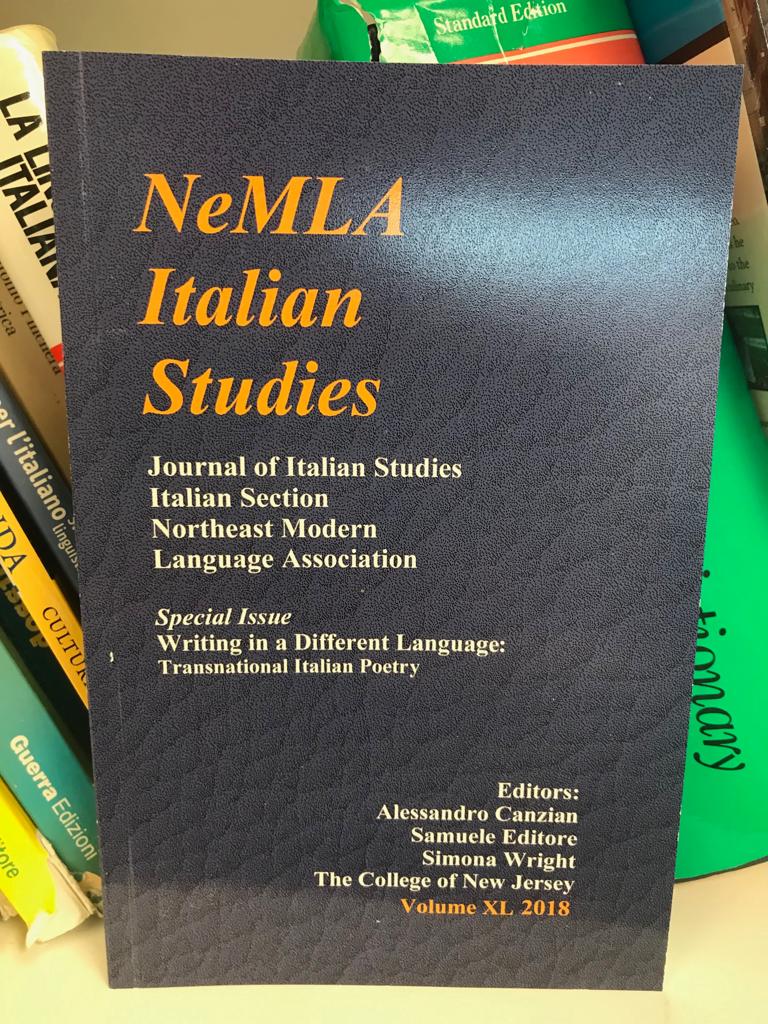




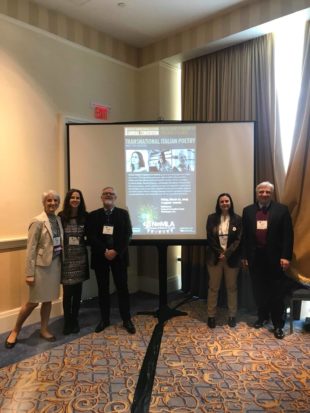
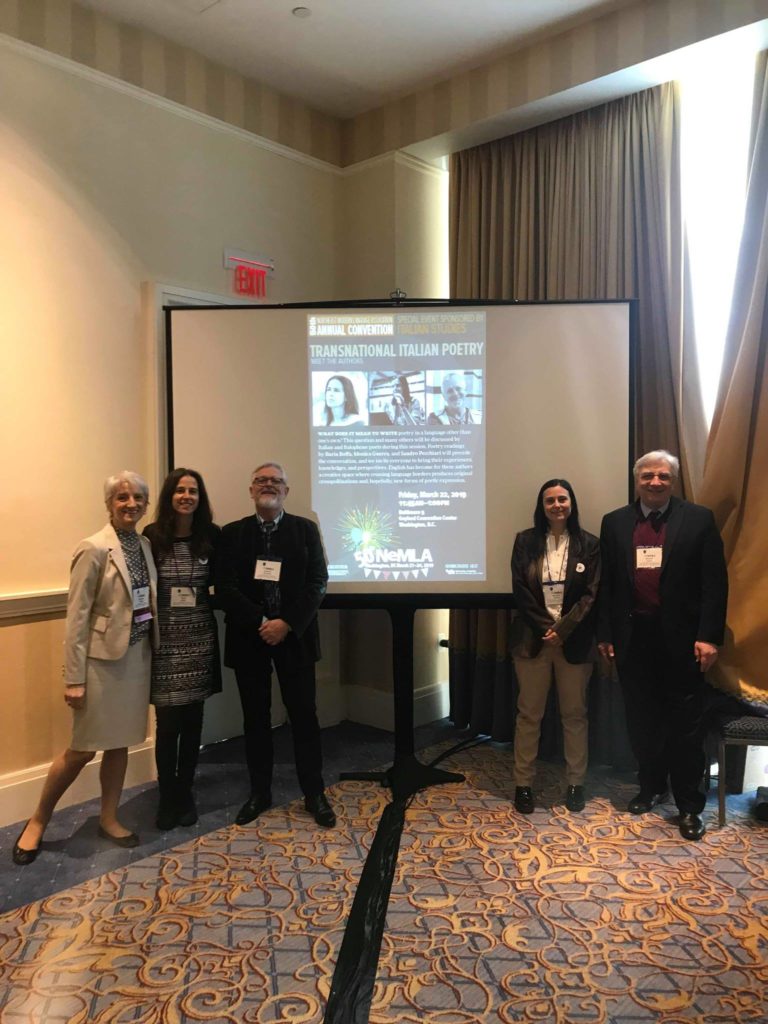
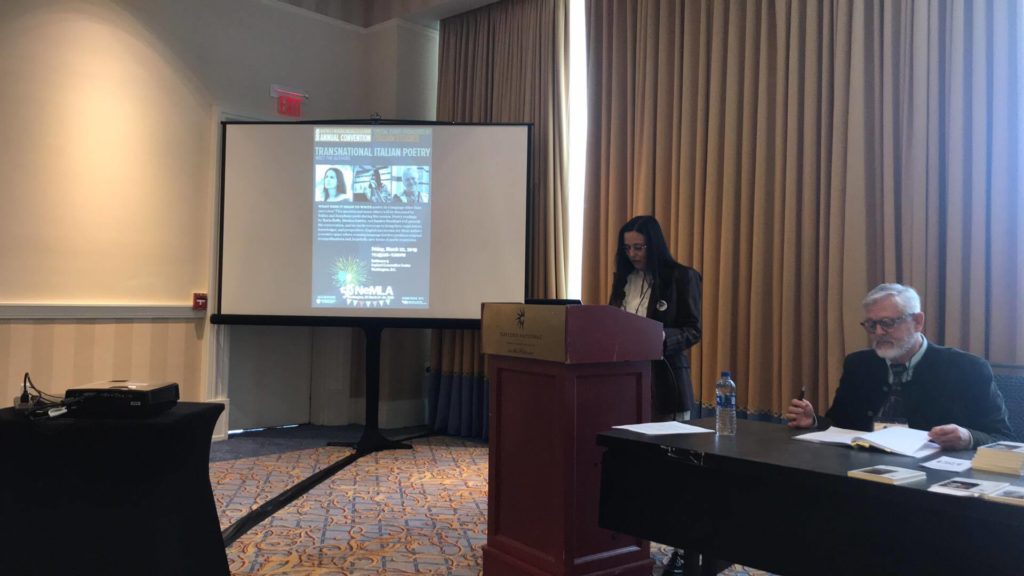
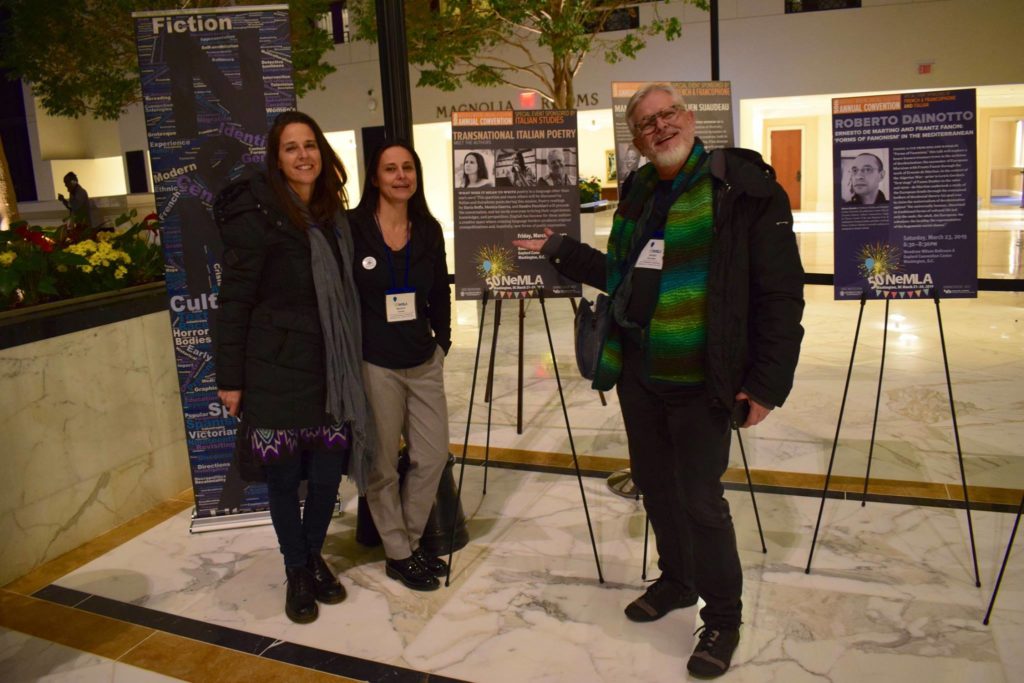 Articolo dal Corriere sul Nemla,
Articolo dal Corriere sul Nemla, Introduction: Transnational Italian Poetry
Introduction: Transnational Italian Poetry

